Back in my last term at Duke our technology strategy professor, Wes Cohen, assigned us two chapters from The Soul of a New Machine by Tracy Kidder. I'm reading the whole book now that I've got some time. Anyone who has the least interest in how teams work and where technology comes from should read it.
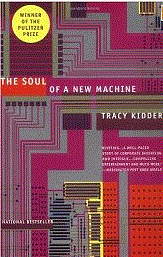 Kidder embedded himself in a team at the Data General corporation from early 1978 to late 1979 as they struggled to bring a 32-bit minicomputer to life. He describes borderline-Apergers engineers, 14-hour days, building motherboards from scratch, untested technologies, irresponsible schedules, burnout, and success—all around a computer that expressed the state of the art for perhaps six months after it came out. When Kidder wrote the book, in 1980, neither he nor any of the people he wrote about knew that minicomputers had become obsolete as a class already. None of them could see that IBM's toy computer, the PC, was about to make Data General irrelevant.
Kidder embedded himself in a team at the Data General corporation from early 1978 to late 1979 as they struggled to bring a 32-bit minicomputer to life. He describes borderline-Apergers engineers, 14-hour days, building motherboards from scratch, untested technologies, irresponsible schedules, burnout, and success—all around a computer that expressed the state of the art for perhaps six months after it came out. When Kidder wrote the book, in 1980, neither he nor any of the people he wrote about knew that minicomputers had become obsolete as a class already. None of them could see that IBM's toy computer, the PC, was about to make Data General irrelevant.
Kidder describes the team debugging prototype CPUs using oscilloscopes. He explains the near-impossibility of writing microcode—the instructions that tell a physical set of chips what to do and in what order—without using a second computer to write it on. He talks about engineers carrying around punchboard covered in blue and red wires, the red ones representing bug fixes, the blue representing the first attempt. You think it sucks figuring out which class broke the build in a modern C# development environment? Try imagining your joy at discovering that the CPU didn't work because a piece of solder came undone.
I imagine my reaction to this book might be similar to that of a modern nuclear submariner reading a contemporary account of building a state-of-the-art wooden battleship in 1862 (with only a brief mention of the Monitor and Merrimac, because almost no one understood in 1862 what those ships meant to naval combat). There are parts that made me wince, exactly as I winced in the episode of Mad Men when they showed an invitation to a wedding—to be held 22 November 1963.
About two years ago I read Pete Peterson's account of the heyday of WordPerfect Corp., which I also recommend, but for different reasons. Peterson wrote knowing the outcome, and he also had an axe to grind; but "Almost Perfect" still hits me right in the gut as a practicing software developer.
Twenty or thirty years from now, I'll look back and laugh at everything I didn't know in 2011. The Soul of a New Machine is a brilliantly-written monument to getting the job done, and advancing the profession right into a cul-de-sac.
On this day 150 years ago, the United States began its bloody civil war that left the South in ruins and 600,000 Americans dead. And on this day 50 years ago, Yuri Gagarin became the first human being to leave the planet and return safely.
But who, other than James Fallows, remembered that 10 years ago today, Microsoft strangled Clippy?
But what about Clippy? It's a big day for him too. Ten years ago, he was finally given the deep-six at Microsoft, or at least turned off by default as the first step to full elimination, so he would no longer automatically pop up with such helpful observations as, "It looks like you're writing a letter!" At Microsoft's Mix11 conference for web developers today in Las Vegas, Dean Hachamovitch, head of IE activities at Microsoft, announced the anniversary of Clippy's demise.
An Air France A380 collided with a commuter jet at JFK yesterday:
The tip of the left wing of the Air France Airbus 380 - the largest passenger plane made - bound for Paris hit the tail of a stationary Delta Comair Regional Jet 7 at 8:08 p.m., officials and witnesses said.
The Delta flight, which had just landed from Boston, was a connection to JFK for many London passengers. Those onboard exited onto the tarmac.
The NTSB press release reported no injuries among the 537 passengers and 29 crew members involved.
For several reasons—about 730 of them, really—I'm at Raleigh/Durham Airport for a couple of hours between London and Chicago. Yes, a direct flight to Chicago today would have cost $730 more. Someday, we'll discover that airline pricing schemes actually tap into the deepest secrets of the universe; for now, I'll just scratch my head and sit at RDU until 5pm.
On the way out to London, I got a photo of a phenomenon I've seen many times but never documented clearly. You know how the planet is more or less spherical? Here's some proof:
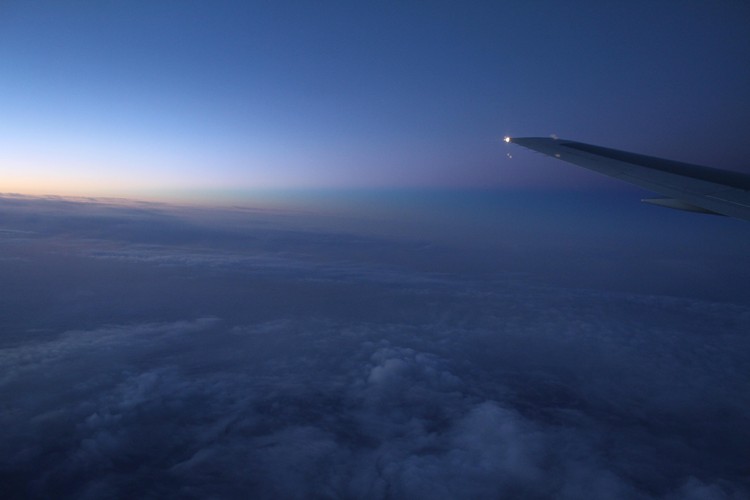
You can see this if you fly about 15 minutes past the terminator between night and day. The dark-blue wedge with the point on the left and the wide part under the wingtip is the earth's shadow.
I spent an unremarkable afternoon wandering an unremarkable suburb of London. Oh, Kew Gardens is pretty enough, and so was the weather, that I had a relaxing time, and I may even have avoided a major sunburn. The only remarkable thing about the walk was the Thames at low tide, which, even this far up, still ebbs and flows about 5 meters:
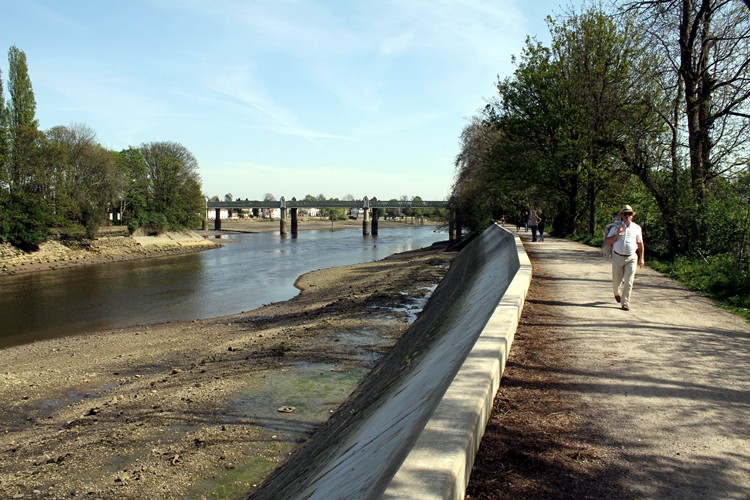
After the walk, I sat outside with a book and a beer. Sadly I did not have a dog, though the folks at the next table did, so all was not lost.
I met one of my oldest surviving friends in York this afternoon, thanks to the fast and cheap railways they've got in the UK. It's one thing to stay in a hotel built before my home town was founded; it's quite another to walk along a wall built over a thousand years before that.
First obligatory photo: York Minster, which opened as a small wooden church in 627 CE, and achieved this form somewhere around 800 years ago:
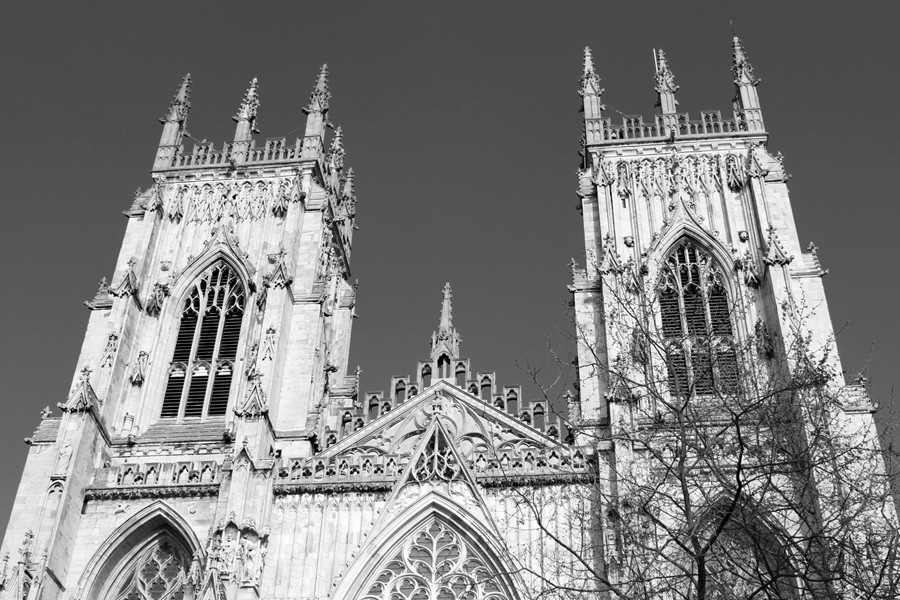
We also took advantage of an open house hosted by the York Glaziers Trust, who work to restore the stained glass at the Minster. I snapped this before seeing the "no photographs" sign:
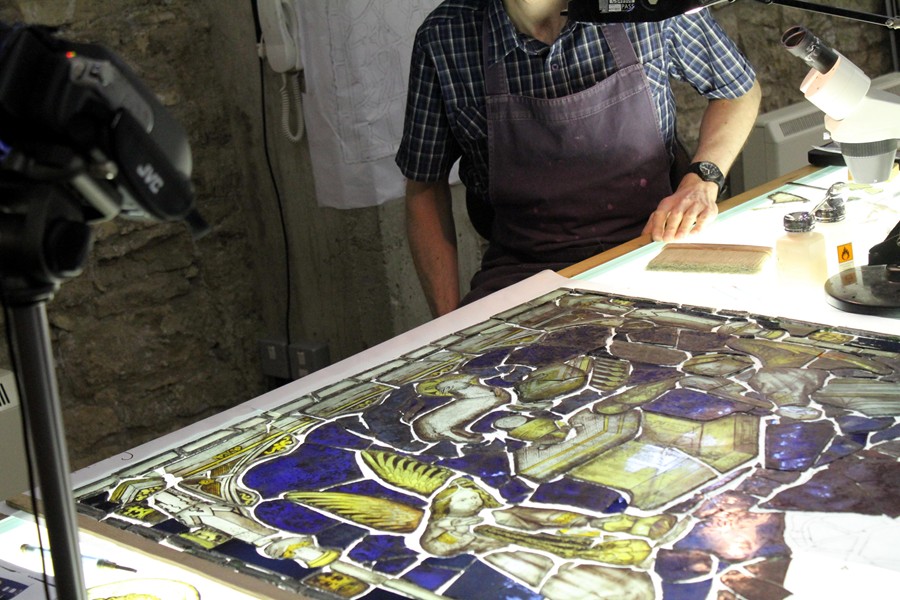
That's one panel of the 120 or so that make up the east wall of the Minster. John Thornton installed the windows about ten years before Columbus got lost in the Atlantic, or about 300 years before my country came into being. My friend and I both wondered if they'd ever dropped a piece of 15th-century glass, but we were both too chicken to ask the conservationists.
Getting out of York required jumping forward to the last few years, when York restored its Victorian-era railway station:
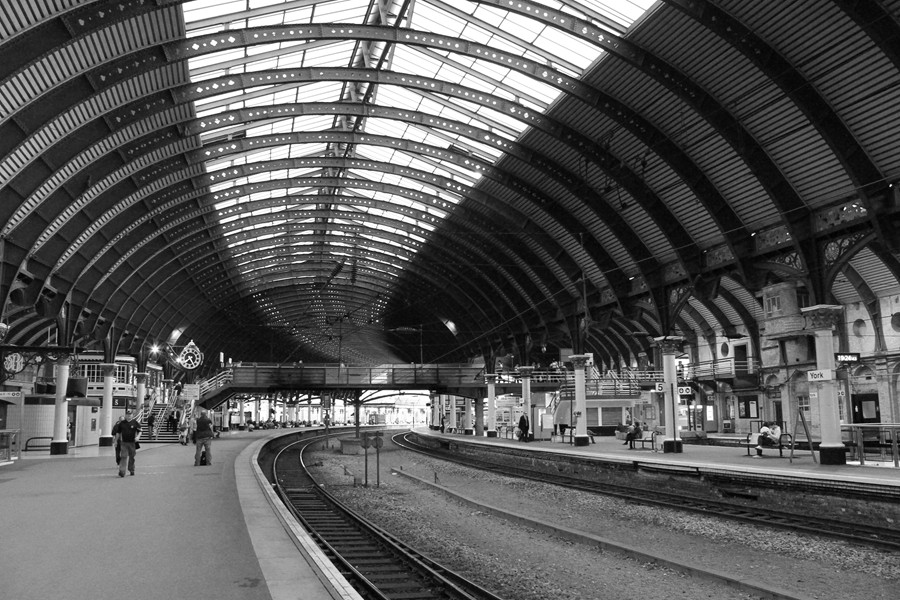
I've got one more day in the Land of Uk, so tomorrow look for some nighttime shots.
(About this post's title: for some reason I keep hearing the Swedish Chef in my head.)
I've walked on the Queen's Walk along the Thames about a half-dozen times, but on a day like today, I just had to do it again. This time, though, I had the beast with me, so I could do this:
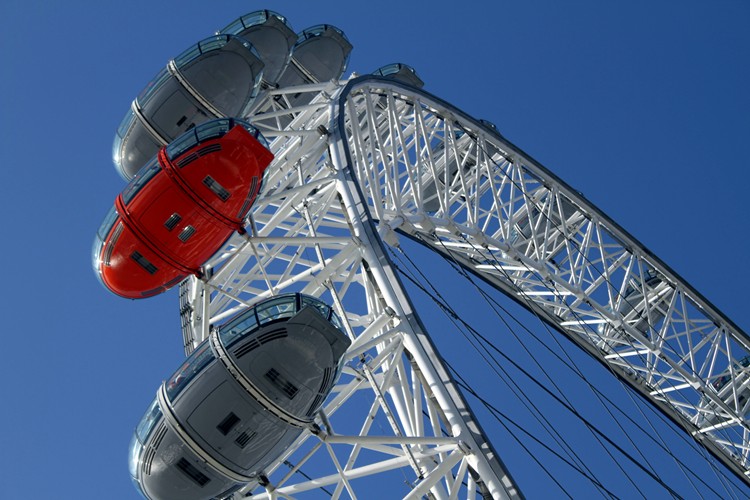
And this:
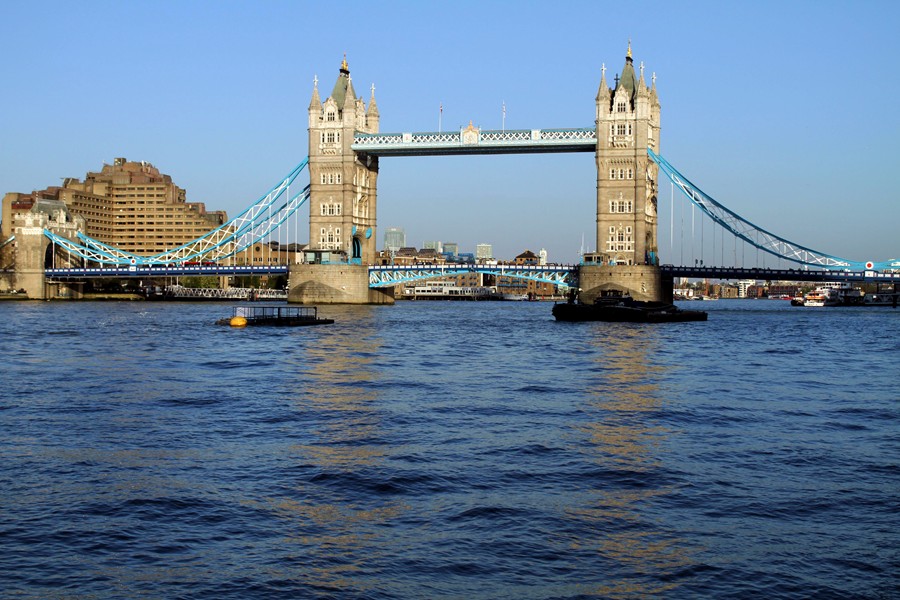
When I last photographed Tower Bridge on a sunny day, the painting crews hadn't finished yet. Today it looked perfect.
This is the Brompton Oratory, South Kensington, London, just today:
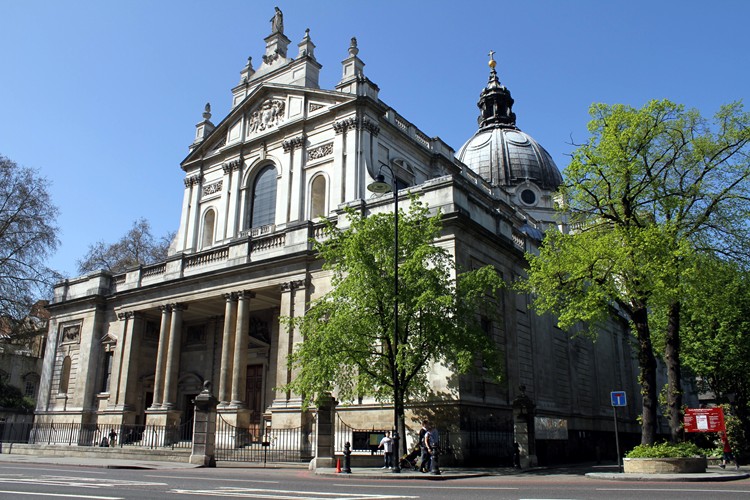
So what's the problem? The sun. It's out. In early April. And when I took the photo about two hours ago, it was 20°C outside.
More early-April madness:
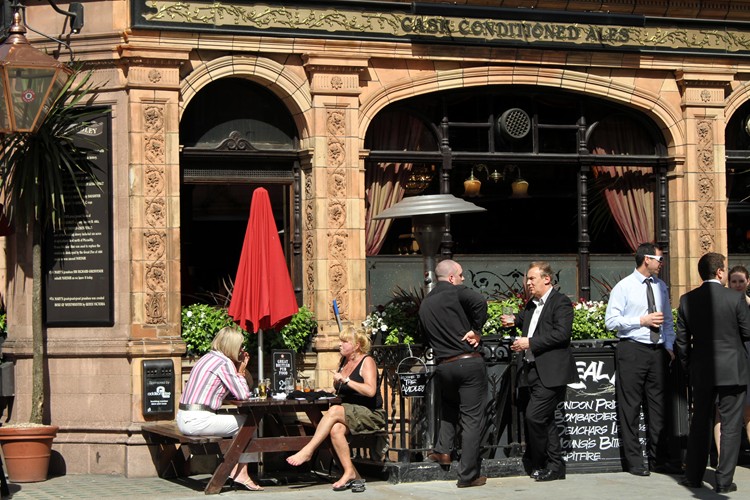
Just look, will you? Londoners eating lunch outside. Insanity!
The weather is so freakish that I've actually got a mild sunburn. A sunburn! In London! I don't even think they sell sunscreen in the UK. But I'm going to go have a look—just to make sure for myself that the weather really is this weird.
Because coming to the UK and not moaning about something would be like going to Wrigley and not having an Old Style, here goes. My troubles began last night when my plane arrived fifteen minutes early at Heathrow, and then we had to collect our bags from the spot where the baggage handlers had them waiting for us when we got through Border Control. This got me through the airport from touchdown to the Tube in 40 minutes, which is unacceptably efficient. The Tube itself cost almost £2 all the way to Central London, took nearly half an hour, and didn't even have any drunk people on it.
At least the lifts were out at Earl's Court so I could carry my bag up some stairs, and I had to deal with a comforting cock-up involving the hotel's credit-card machine, both of which made me feel like I'd gotten to the real UK. Unfortunately, the night clerk ruined it by working efficiently and professionally to get through the issue and get me checked in. Then, once that was done, I was unable not to find a curry restaurant still open, and I had to have a chicken tikka with actual spices and flavor procured by a polite and smiling—smiling, in London, the thought!—server.
Finally, this morning, when my room's Internet connection went out, the day clerk completely broke from British custom and offered to fix the problem himself, so that when I got back from getting some coffee, it worked fine.
Don't even get me started on the weather. I came all the way to the UK only to have the trip ruined by sunny skies and 20°C temperatures. I mean, not even one bloody cloud in the sky. Now I suppose I'll have to spend the entire day walking around in it, and possibly eat lunch sitting outside. One just doesn't do that in London in April; it's just not done.
I really don't know if I can take four days of this.